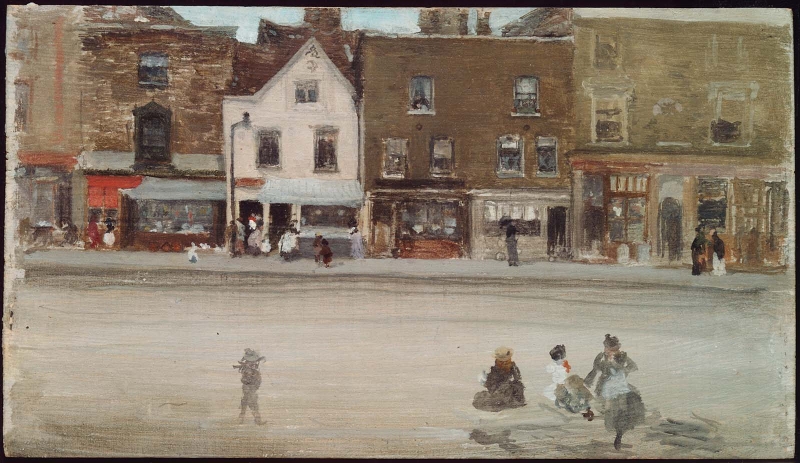Home > Catalogue > Browse > Street in Old Chelsea << >>
Titles
Several possible titles have been suggested:
- Possibly 'Harmony in Yellow and Brown – Sunday' (1884, Dowdeswell). 1
- 'Street in Old Chelsea' (1904, Copley Society, Boston). 2
- 'Street in Old Chelsea' (1980, YMSM). 3
Since the 1884 title is not certain, the descriptive title 'Street in Old Chelsea' is preferred.
Description
A row of three storey houses, with shops on the ground floor, is seen across a wide street. In the foreground at right are several people sitting on a bench. A few people are on the distant pavement by the shops. The houses are all different sizes and shapes, the view dominated by a white-painted fish shop to left of centre.
Site
Cheyne Walk, Chelsea, London. The scene includes Maunder's Fish Shop, and the shops of a tailor, a boot-maker, a chimney sweep, and a plumber. Whistler drew Maunder's in a lithograph, Maunder's Fish Shop, Chelsea c037, in 1890, and in two etchings (Fish-Shop, Chelsea [267] in 1886, and Little Maunder's [273] in 1887). Fish-Shop, Chelsea shows virtually the same scene as the oil, though, being a print, it is in reverse.
Mrs Elizabeth Maunder's fish-shop was at 72 Cheyne Walk, Chelsea, London. The building was demolished in 1892 (the lithograph shows a sign saying 'TO BE SOLD'). The medallion from the top of the gable-end is now in Chelsea Public Library. Whistler later lived in the house that replaced it, which was built by the architect Charles Robert Ashbee (1863-1942), and which was destroyed in World War 2.
Comments
Whistler's shop fronts are discussed in depth by Anna Robins, who comments on the grinding poverty of the area, where the inhabitants lived literally hand-to-mouth, trying to make ends meet, with the fish shop representing 'the take-away food culture of fried fish ... when they had enough money to supplement their staple diet of bread and dripping with a treat.' 4 In the oil painting and the etching of the same scene, children throng the street, peering into the shops, running errands, playing, living on the streets because their homes were horrendously over-crowded. 5
Notes:
1: 'Notes' - 'Harmonies' - 'Nocturnes', Messrs Dowdeswell, London, 1884 (cat. no. 42).
2: Oil Paintings, Water Colors, Pastels and Drawings: Memorial Exhibition of the Works of Mr. J. McNeill Whistler, Copley Society, Boston, 1904 (cat. no. 72).
3: YMSM 1980 [more] (cat. no. 249).
4: Robins 2007 [more], pp. 129-29.
5: Margaret F. MacDonald, Grischka Petri, Meg Hausberg, and Joanna Meacock, James McNeill Whistler: The Etchings, a catalogue raisonné, University of Glasgow, 2012, online at http://etchings.arts.gla.ac.uk.
Last updated: 7th June 2021 by Margaret







